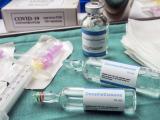A new study finds waning Pfizer/BioNTech COVID-19 vaccine protection against symptomatic infection in Brazilian and Scottish teens starting 27 days after the second dose amid the Delta and Omicron variant waves, but protection against severe illness was still strong at 98 days in Brazil.
The study, published yesterday in The Lancet Infectious Diseases, analyzed nationwide data from 503,776 COVID-19 tests of 2,948,538 adolescents aged 12 to 17 years from Sep 2, 2021, to Apr 19, 2022, in Brazil, and 127,168 tests of 404,673 adolescents from Aug 6, 2021, to Apr 19, 2022, in Scotland. Protection against severe illness, defined as hospitalization or death within 28 days, was estimated only in Brazil owing to the small number of such cases in Scotland.
The researchers estimated vaccine effectiveness (VE) against symptomatic COVID-19 by comparing the time elapsed since the first or second dose in adolescents who tested positive on polymerase chain reaction (PCR) tests in Scotland, or by PCR or antigen test in Brazil, and those who tested negative (controls).
The period was marked by the Omicron surge in both countries, supplanting Delta in December 2021 in Scotland and January 2022 in Brazil. Vaccine rollout for this age-group began in August 2021 in Scotland and September 2021 in Brazil.
The study authors said the study was the first to use national data to assess VE against severe COVID-19 outcomes over time among adolescents amid Omicron.
VE against Omicron symptoms 5.9% at 98 days in Brazil
In Brazil, over the study period, 176,002 (34.9%) COVID tests were positive, and 327,774 (65.1%) were negative. During Omicron, 355,066 tests were recorded, with 150,291 (42.3%) positive, and 204,775 (57.7%) negative. Among patients who had 150,291 Omicron-positive tests, 585 (0.4%) became severely ill.
In Scotland, 60,574 COVID-19 tests were positive (47.6%), and 66,616 were negative (52.4%) over the study period. Of the 45,771 tests performed during Omicron, 26,177 (57.2%) were positive, and 19,954 (42.8%) were negative.
Estimated vaccine effectiveness (VE) peaked 14 to 27 days after dose two in both countries in both the Delta and Omicron waves and was significantly lower against symptomatic COVID-19 during Omicron in Brazil (64.7%; 95% confidence interval [CI], 63.0% to 66.3%) and Scotland (82.6%; 95% CI, 80.6% to 84.5%) than amid Delta in Brazil (80.7%; 95% CI, 77.8% to 83.3%) and Scotland (92.8%; 95% CI, 85.7% to 96.4%).
During Omicron, 27 days after the second vaccine dose, VE against symptomatic infection began to fall, plummeting to 5.9% (95% CI, 2.2% to 9.4%) in Brazil and 50.6% (95% CI, 42.7% to 57.4%) in Scotland at 98 days or more. Over the same period after dose two in Brazil, VE against severe infection stayed above 80% at 28 days and was 82.7% (95% CI, 68.8% to 90.4%) at 98 days or more.
"Two doses of vaccination with BNT162b2 [Pfizer] among adolescents are insufficient to sustain protection against symptomatic disease; however, they do offer substantial protection against serious COVID-19 outcomes for at least 3 months," the researchers wrote. "Our findings support the importance of maximizing vaccination coverage and the consideration of booster doses for adolescents, though further research is needed."





















